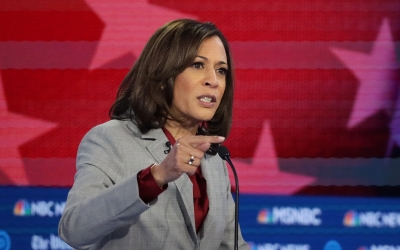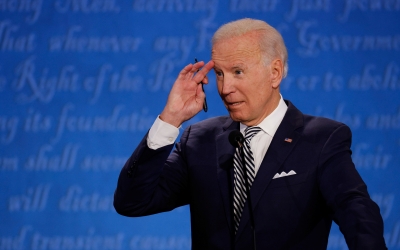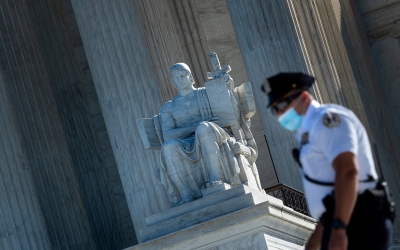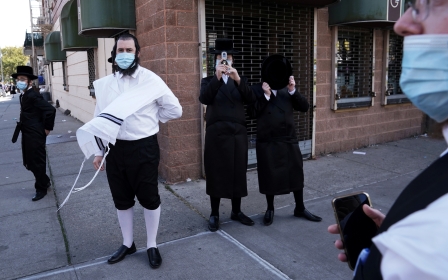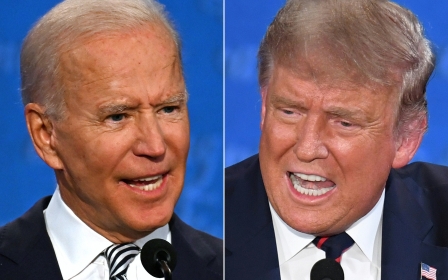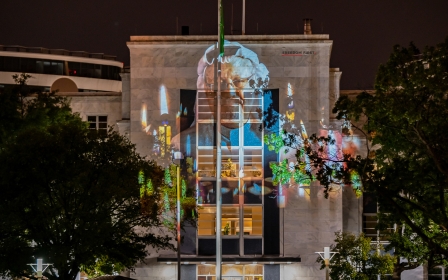US elections: Four Middle East moments from Harris-Pence debate
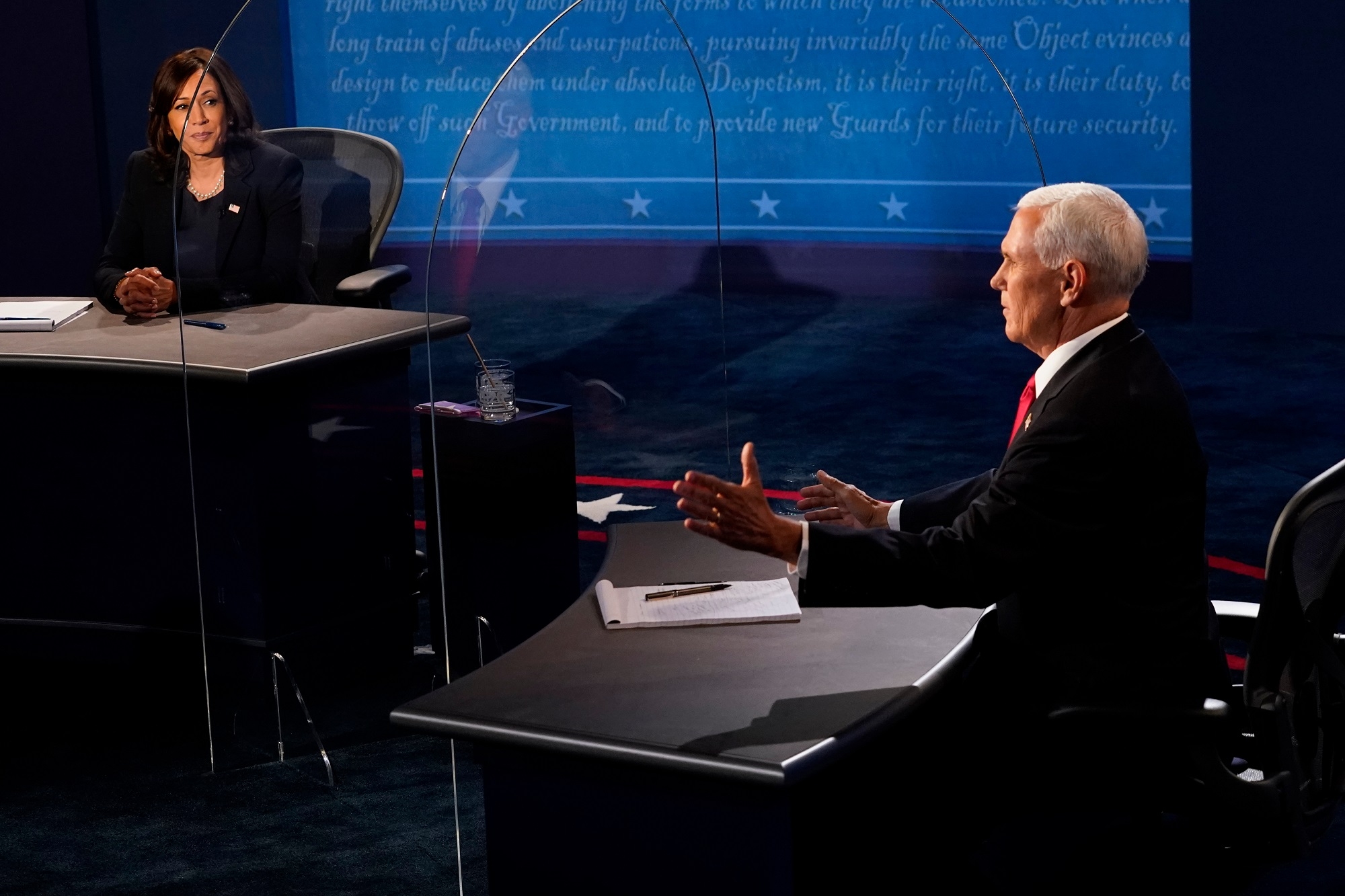
If political debates were a sport, US vice presidential debates would be a game between the reserve teams.
But eight days after a chaotic debate between President Donald Trump and his opponent Joe Biden failed to deliver meaningful policy discussions, Wednesday's showdown between their running mates was an opportunity to contrast the respective campaigns' vision for the United States and the world.
Vice President Mike Pence and his Democratic rival, Senator Kamala Harris, discussed a broad range of issues on Wednesday night, including foreign policy - a topic that hardly came up in last week's debate.
Despite the frequent interruptions and both candidates' attempts to evade answering questions directly, the conversation remained relatively substantive, calm and civil - especially when compared to last week.
On the Middle East, Pence tried to portray Trump's policies on Iran and other issues as a great success, while Harris denounced the president's approach as erratic.
Here are four key moments from the debate.
Kamala Harris slams Trump for nixing Iran deal
When discussing Washington's relationship with its allies, Harris berated the US administration for withdrawing from the Iran nuclear deal and accused Trump of failing to live up to America's commitments.
She said nixing the multilateral pact harmed the security of the United States, claiming that Iran is now building up what might become a "significant nuclear arsenal".
"We were in the Iran nuclear deal with friends, with allies around the country," Harris said. "And because of Donald Trump's unilateral approach to foreign policy, coupled with his isolationism, he pulled us out and has made America less safe."
The agreement, known as the Joint Comprehensive Plan of Action (JCPOA), was signed when Biden was serving as Barack Obama's vice president in 2015. It saw Tehran scale back its nuclear programme in exchange for lifting sanctions against its economy.
Trump left the pact in May 2018 and has piled sanctions on various Iranian industries and individuals ever since. In turn, Iran has reduced some restrictions on uranium enrichment spelled out by the agreement.
Biden has vowed to rejoin the JCPOA if Iran returns to full compliance.
"The thing that has always been part of the strength of our nation - in addition to our great military - has been that we keep our word. But Donald Trump doesn't understand that because he doesn't understand what it means to be honest," Harris said on the debate stage.
Pence talks up killing Qassem Soleimani
After the Democratic senator cited the JCPOA, Pence hailed the killing of top Iranian general Qassem Soleimani, saying Americans are safer because of Trump.
The Iranian general was killed in a US air strike early in 2020 after a spike in tensions between Washington and Tehran that saw Iranian-allied Iraqi militants attempt to storm the US embassy in Baghdad.
"Qassem Soleimani, the Iranian general, was responsible for the death of hundreds of American service members. When the opportunity came, we saw him headed to Baghdad to kill more Americans, President Trump didn't hesitate and Qassem Soleimani is gone," Pence said.
"But you deserve to know that Joe Biden and Kamala Harris actually criticised the decision to take out Qassem Soleimani. It's really inexplicable."
Both Biden and his running mate had indeed questioned Trump's decision at the time, with many Democrats sounding the alarm against a possible all-out war with Iran and criticising the president for lacking a sound strategy after leaving the nuclear deal.
"Make no mistake: Soleimani was an enemy of the United States, but Trump’s actions have further enflamed tensions and destabilised the region," Harris said at the time.
"It is essential that Congress take its constitutional responsibility seriously and work to de-escalate the situation."
Pence hails Jerusalem embassy move
The vice president also lauded Trump for moving the US embassy from Tel Aviv to Jerusalem, declaring the contested holy city as the capital of Israel.
The move, which was rejected by the overwhelming majority of the UN General Assembly, enraged Palestinians but received the support of some top Democrats in Congress.
"President Trump kept his word when we moved the American embassy to Jerusalem, the capital of the State of Israel," Pence said on Wednesday. "When Joe Biden was vice president, they promised to do that and they never did. We stood strong with our allies."
The previous US administration had not promised to relocate the embassy. In fact, days before leaving office, Obama warned against the move.
Still, as a candidate in 2008, Obama had said that Jerusalem "must remain undivided" as the capital of Israel, a statement he later described as "poor phrasing".
Biden has ruled out moving the embassy back if elected, but he has vowed to open a consulate for Palestinians in East Jerusalem.
Both Biden and Harris have been vocal supporters of Israel with only mild, verbal criticism of settlement expansion. Top Democrats have also rejected a push by progressives to impose human rights conditions on the $3.8bn-a-year US military aid to the Israeli government.
"Joe has made it clear he will not tie security assistance to any political decisions that Israel makes, and I couldn't agree more," Harris told a virtual fundraiser with Jewish-American voters in August.
Harris hits out at Trump over 'Muslim ban'
The Democratic vice presidential nominee portrayed Trump as a bigot, calling him out over his failure to clearly condemn white supremacist groups when asked about the subject at last week's debate.
"This is a part of a pattern of Donald Trump's," Harris said. "He called Mexicans rapists and criminals. He instituted - as his first act - a Muslim ban."
Trump, who had called for banning all Muslims from entering the United States when he was candidate in 2015, signed an executive order to ban travellers from several Muslim majority countries early in his presidency.
Harris also called out Trump over his infamous "very fine people on both sides" statement, when he equated neo-Nazi demonstrators in Charlottesville, Virginia, to counter-protesters with whom they clashed.
Pence retorted by insisting that the president has condemned white supremacist groups. He also invoked the president's Jewish family members.
"You're concerned that he doesn't condemn neo-Nazis; President Trump has Jewish grandchildren. His daughter and son-in-law are Jewish," Pence said, referring to Jared Kushner and Ivanka Trump, who converted to Judaism in order to marry Kushner.
"This is a president who respects and cherishes all of the American people."
What's next?
The vice presidential race this year is of special importance because of the age of the candidates at the top of the ticket for both major parties. Biden, 77, and Trump, 74, are the oldest presidential nominees in American history.
The US president and vice president are elected on a joint ticket. The VP fills the role of the presidency in the case of a vacancy, including resignation, removal from office, inability to perform the job or death.
Wednesday's event will be the only debate between Harris and Pence. Biden and Trump still have two more debates, with the next one scheduled for 15 October. However, the upcoming event is surrounded by uncertainty, as Trump is still recovering from the coronavirus.
Early voting is underway in several states, and recent public opinion polls show Biden leading with a comfortable margin. The election is on 3 November.
Middle East Eye propose une couverture et une analyse indépendantes et incomparables du Moyen-Orient, de l’Afrique du Nord et d’autres régions du monde. Pour en savoir plus sur la reprise de ce contenu et les frais qui s’appliquent, veuillez remplir ce formulaire [en anglais]. Pour en savoir plus sur MEE, cliquez ici [en anglais].


